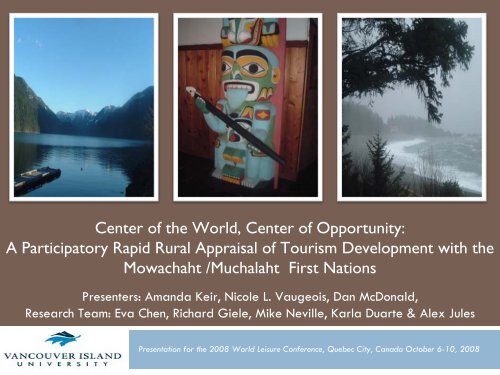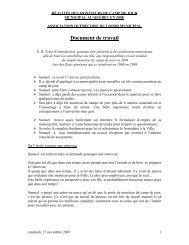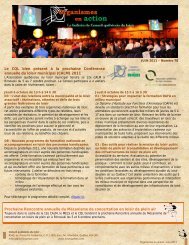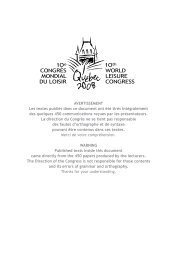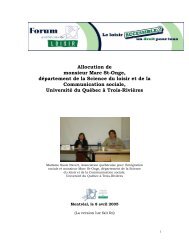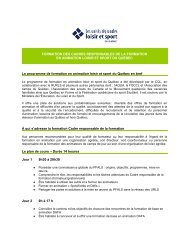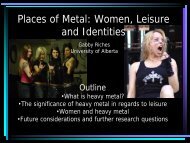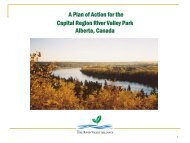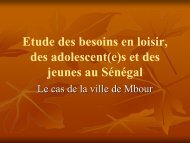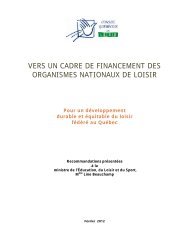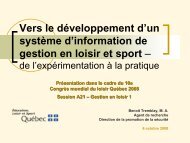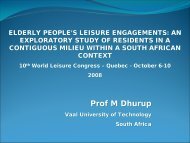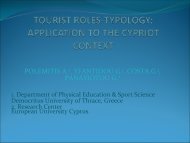A Participatory Rapid Rural Appraisal of Tourism Development with ...
A Participatory Rapid Rural Appraisal of Tourism Development with ...
A Participatory Rapid Rural Appraisal of Tourism Development with ...
You also want an ePaper? Increase the reach of your titles
YUMPU automatically turns print PDFs into web optimized ePapers that Google loves.
Center <strong>of</strong> the World, Center <strong>of</strong> Opportunity:<br />
A <strong>Participatory</strong> <strong>Rapid</strong> <strong>Rural</strong> <strong>Appraisal</strong> <strong>of</strong> <strong>Tourism</strong> <strong>Development</strong> <strong>with</strong> the<br />
Mowachaht /Muchalaht First Nations<br />
Presenters: Amanda Keir, Nicole L. Vaugeois, Dan McDonald,<br />
Research Team: Eva Chen, Richard Giele, Mike Neville, Karla Duarte & Alex Jules<br />
Presentation for the 2008 World Leisure Conference, Quebec City, Canada October 6-10, 2008
Overview<br />
What is a <strong>Participatory</strong> <strong>Rural</strong> <strong>Appraisal</strong><br />
Outline the study design<br />
Show observations from the study<br />
Discuss the realities <strong>of</strong> the application and share insights<br />
on the use in other communities<br />
Final thoughts and questions
“Partly due to the flaws in conventional approaches, there<br />
has been a recent rapid expansion in participatory<br />
methods and approaches. These began <strong>with</strong> the<br />
development <strong>of</strong> data gathering methods which came to<br />
be known as rapid rural appraisal”<br />
(Pretty and Vodouhe, 1998)
<strong>Participatory</strong> <strong>Rural</strong> <strong>Appraisal</strong> (PRA)<br />
Evolved from rapid rural appraisal<br />
Uses an array <strong>of</strong> methods to bring together practitioners,<br />
government and local people<br />
Uses the information gathering and reporting process to<br />
help residents contribute information to decision making<br />
and better understand issues & choices in the community<br />
Helps develop capacity among residents<br />
Results conducted “<strong>with</strong>” rather than “for” the community<br />
so that there is more ownership and implementation
Key Tenets <strong>of</strong> PRA<br />
Participation<br />
Teamwork<br />
Flexibility<br />
Optimal<br />
ignorance<br />
Triangulation
Advantages <strong>of</strong> the Method<br />
timeframe that is useful and cost-effective for the<br />
community<br />
team <strong>of</strong> researchers <strong>with</strong> diverse backgrounds to provide<br />
different perspectives<br />
Researchers spend days, reviewing documents, observing,<br />
living <strong>with</strong> residents and interacting <strong>with</strong> people<br />
Results <strong>of</strong> study are prepared and shared in the field<br />
Builds a basis for on ongoing relationship <strong>with</strong> university<br />
and community
Study Design<br />
Provincial goal to<br />
increase aboriginal<br />
engagement in tourism<br />
Aboriginal communities<br />
approaching tourism <strong>with</strong><br />
caution because <strong>of</strong> the<br />
balance <strong>of</strong> cultural<br />
integrity <strong>with</strong> economic<br />
development
Study Design Continued<br />
Team consisted <strong>of</strong> 8<br />
University researchers<br />
and 2 representatives<br />
from the Ministry <strong>of</strong><br />
<strong>Tourism</strong>, Sport and the<br />
Arts, the Band<br />
Administrator, <strong>Tourism</strong><br />
<strong>Development</strong> Coordinator<br />
and Band members
Study Objectives<br />
1. Provide insights from a visitor, resident and tourism expert lens<br />
on how the community could enhance the visitor experience;<br />
2. Identify assets (natural, cultural and historical) that may be used<br />
to develop amenity based industries like recreation and tourism;<br />
3. Engage residents in dialogue about aboriginal tourism<br />
development (pros, cons, strategies) and in the identification <strong>of</strong><br />
assets that are appropriate for tourism development;<br />
4. Identify short term strategies to improve operations and<br />
pr<strong>of</strong>itability <strong>of</strong> the MMFN Marina.
Methods Employed<br />
Review <strong>of</strong> background studies<br />
Impressions in other communities<br />
Direct observation<br />
In-depth interviews<br />
Group walks<br />
Site interviews<br />
Mapping and aerial photography<br />
Journaling<br />
<strong>Rapid</strong> report writing in the field
PRA <strong>of</strong> Mowachaht / Muchalaht First Nations Slideshow
Insights gained
Community Receptivity and Ownership<br />
Access to<br />
sources <strong>of</strong><br />
data
Cultural Context Matters<br />
Protocols <strong>of</strong><br />
relationships
Meta Analysis Sharpened By Multiple<br />
Perspectives<br />
Importance<br />
<strong>of</strong> role<br />
clarity <strong>with</strong><br />
the team<br />
Capitalize<br />
on<br />
researcher<br />
strengths
Intensity <strong>of</strong> Researcher Engagement<br />
Students,<br />
faculty,<br />
community,<br />
and policy<br />
maker<br />
exchange<br />
Foundation<br />
for future<br />
relationship
Engagement Begins Early
And continues after…<br />
Emphasis on relationship building calls for post PRA<br />
engagement and support
Lessons learned…<br />
PRA is a useful tool for engagement <strong>with</strong> tourism<br />
development (particularly <strong>with</strong> aboriginal<br />
communities where ownership <strong>of</strong> assets is vital to<br />
success)<br />
Potential as a meta analysis tool<br />
Opportunity for student exposure to multiple<br />
research methods<br />
Pre and post PRA engagement needs to be<br />
considered prior
Closing Thoughts –<br />
“ The focus is less on what we learn, and more on how<br />
we learn and <strong>with</strong> whom. This implies new roles for<br />
development pr<strong>of</strong>essionals, leading to whole new<br />
pr<strong>of</strong>essionalism <strong>with</strong> new values, methods and<br />
behaviour”<br />
(Petty and Vodouhe, 1998)
Report<br />
For a copy <strong>of</strong> the<br />
final report,<br />
please contact<br />
Nicole Vaugeois<br />
or Dan McDonald
Acknowledgements<br />
Special Thanks To:<br />
The research team Amanda Keir, Nicole L. Vaugeois, Dan<br />
McDonald, Eva Chen, Richard Giele, Mike Neville, Karla Duarte<br />
& Alex Jules<br />
Drew Frymire and Charlie Cornfield from the Ministry <strong>of</strong><br />
<strong>Tourism</strong>, Sport and the Arts<br />
Mowachaht/ Muchalaht First Nations and the Town <strong>of</strong> Gold<br />
River for the invitation to visit their traditional territory and<br />
for hosting the team during their time in the region
Questions<br />
Nicole Vaugeois<br />
Department <strong>of</strong> Recreation and <strong>Tourism</strong> Management<br />
Vancouver Island University<br />
900 Fifth Street, Nanaimo, British Columbia<br />
250. 753.3245 Local 2772<br />
E-mail: Nicole.Vaugeois@viu.ca<br />
Dan McDonald<br />
Department <strong>of</strong> First Nations Studies<br />
Vancouver Island University<br />
900 Fifth Street, Nanaimo, BC<br />
250.753.3245 Local 2187<br />
E-mail: Dan.McDonald@viu.ca<br />
Amanda Keir<br />
BTM (c)<br />
Vancouver Island University<br />
900 Fifth Street, Nanaimo, British Columbia<br />
250.591.0970<br />
E-mail: mandy_keir@hotmail.com
Resources<br />
Bhandari, B. (2003) <strong>Participatory</strong> <strong>Rural</strong> <strong>Appraisal</strong> (PRA). Internet<br />
source available at<br />
http://www.iges.or.jp/en/pub/eLearning/waterdemo/bhandari<br />
_m4.pdf<br />
The World Bank Group (2008). <strong>Participatory</strong> <strong>Rural</strong> <strong>Appraisal</strong>-<br />
Collaborative Decision-making : Community-Based Method. The<br />
World Bank Internet source available at<br />
http://www.worldbank.org<br />
Pretty, J.N. and Vodouhe, S.D. (1998) Using rapid or participatory<br />
rural appraisal. Internet source available at<br />
www.fao.org/docrep/W5830E/w5830e.08.htm


